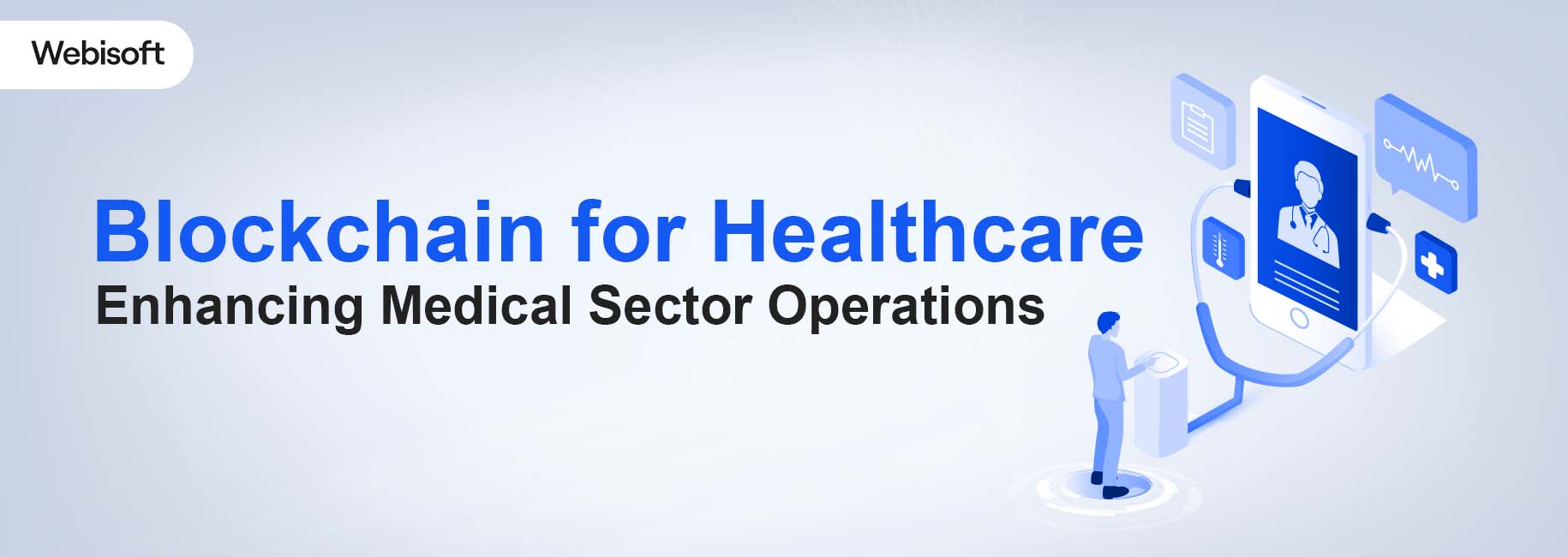Blockchain has revolutionized the healthcare industry by providing a secure, decentralized platform for storing, analyzing, and sharing patient data and medical records. In fact, blockchain for healthcare is a transformative technology. This innovative system ensures the integrity and privacy of sensitive information while enabling full access for authorized parties.
In healthcare, blockchain brings unparalleled benefits, including enhanced data security and interoperability among disparate systems. Choosing blockchain means embracing a solution that safeguards patient data and facilitates efficient information sharing across healthcare providers.
However, are you curious about how blockchain can revolutionize healthcare? Connect with Webisoft to explore this technology’s limitless possibilities for a more secure and efficient healthcare ecosystem.
Contents
- 1 What is the Blockchain for Healthcare?
- 2 Why is Blockchain Important in the Healthcare Industry?
- 3 What Advantages Does Blockchain Offer to the Healthcare Sector?
- 3.1 Enhanced Data Security and Integrity
- 3.2 Improved Interoperability and Data Sharing
- 3.3 Streamlined Clinical Trials and Research
- 3.4 Efficient Supply Chain Management
- 3.5 Empowered Patient Control Over Data
- 3.6 Reduced Administrative Costs
- 3.7 Enhanced Fraud Prevention
- 3.8 Facilitated Compliance with Regulations
- 4 Use Cases of Blockchain for Healthcare
- 5 Challenges in Using Blockchain for Healthcare
- 6 How does Webisoft Facilitate Blockchain Development in the Healthcare Industry?
- 7 Bottom Line
- 8 FAQ
What is the Blockchain for Healthcare?
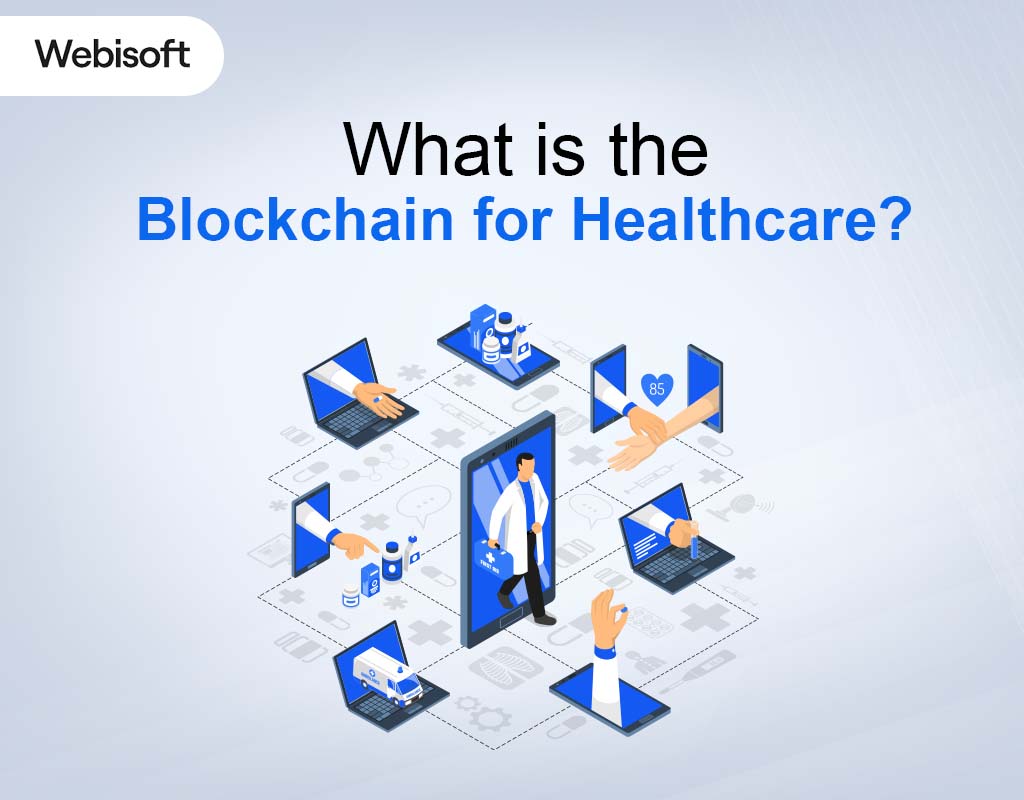
Blockchain in healthcare is a decentralized, secure ledger system that records and manages sensitive patient data. This technological innovation ensures healthcare information’s integrity, privacy, and traceability by storing it across a network of computers rather than a central authority.
Each data entry, or block, is linked chronologically, forming an immutable chain and enhancing data security and authenticity. Blockchain enables secure sharing of patient records among authorized parties, ensuring transparency while safeguarding patient confidentiality.
Why is Blockchain Important in the Healthcare Industry?
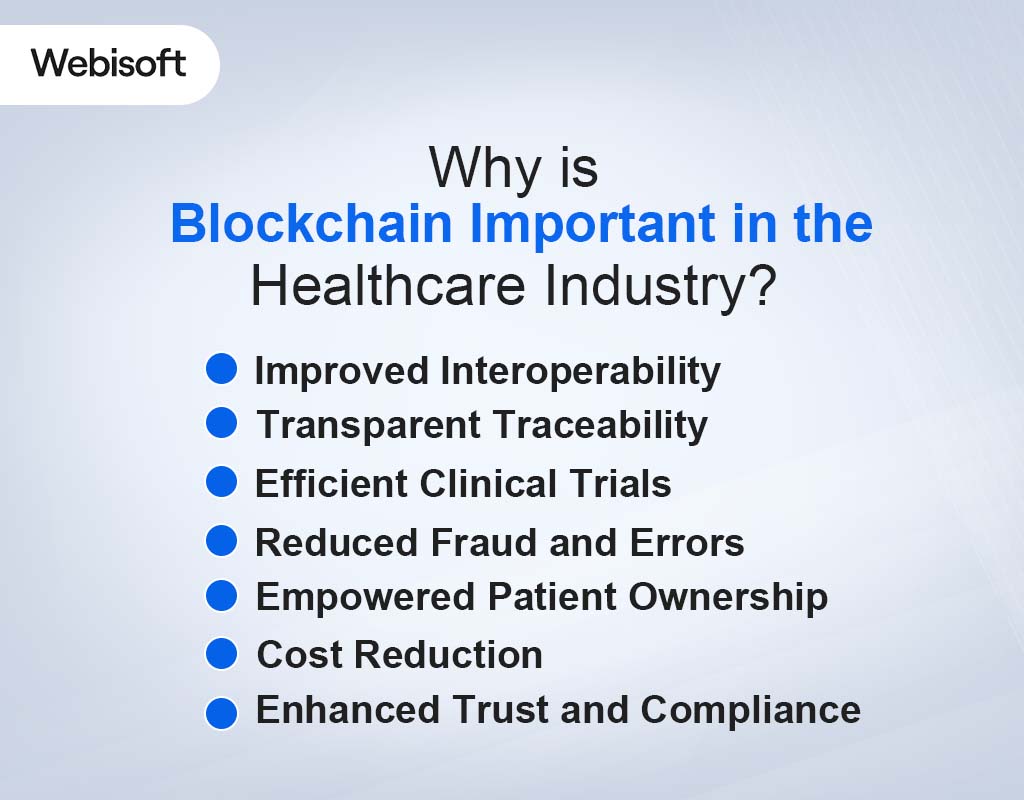
The importance of blockchain in the healthcare industry lies in its ability to increase data security, and modernize processes.
Also it is important to reduce errors, and empower patients, and raise trust and compliance. Blockchain technology signifies a step towards more efficient, secure, and patient-centric healthcare systems.
However, blockchain is important in the healthcare industry for the following reasons:
Improved Interoperability
Blockchain technology modernizes data sharing among diverse healthcare systems and providers. This interoperability nurtures unified communication, reducing administrative hurdles and enhancing collaborative patient care.
Transparent Traceability
Blockchain’s transparent nature enables a comprehensive audit trail of healthcare records. It ensures a traceable and immutable log of data changes, which is vital for tracking information provenance and maintaining authenticity.
Efficient Clinical Trials
Blockchain facilitates more efficient and secure clinical trials by securely recording and managing trial data. This technology ensures accuracy, integrity, and confidentiality throughout the trial process.
Reduced Fraud and Errors
Implementing blockchain mitigates healthcare fraud and errors through its secure and immutable ledger. This system minimizes discrepancies, enhancing accuracy in patient records and financial transactions.
Empowered Patient Ownership
Patients get control over their medical data through blockchain, enabling secure access and control. This empowerment ensures data privacy, fostering a sense of ownership and trust in healthcare interactions.
Cost Reduction
Blockchain’s decentralized framework reduces administrative costs by eliminating intermediaries and streamlining processes. This cost-effectiveness enhances operational efficiency across healthcare systems.
Enhanced Trust and Compliance
Blockchain technology builds trust by ensuring compliance with stringent healthcare regulations. Its transparent and auditable nature promotes accountability and regulatory adherence, fostering trust among patients and stakeholders.
What Advantages Does Blockchain Offer to the Healthcare Sector?
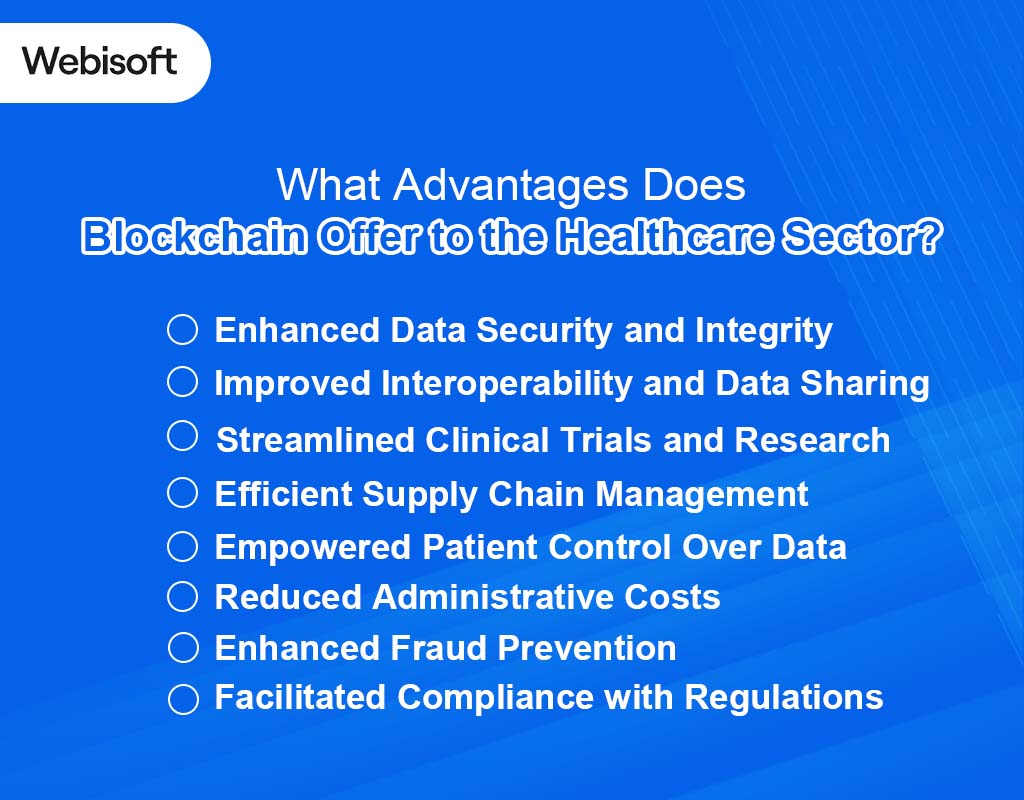
Blockchain technology in healthcare offers numerous benefits. These include heightened data security, improved interoperability, rationalized clinical trials, efficient supply chain management, patient empowerment, cost savings, fraud prevention, and regulatory compliance. Now go through each benefit of blockchain in healthcare in detail:
Enhanced Data Security and Integrity
You can benefit from heightened data security using blockchain in healthcare. The decentralized nature of blockchain ensures that medical records are well managed, encrypted, and stored across a network of computers. This tamper-resistant system protects patient data from unauthorized access and alterations.
Improved Interoperability and Data Sharing
Blockchain enhances data sharing and interoperability in healthcare. It allows continuous sharing of patient records among authorized stakeholders, nurturing collaboration and ensuring accuracy and consistency in medical data across various healthcare providers.
Streamlined Clinical Trials and Research
Using blockchain technology in healthcare modernizes clinical trials and research processes. It ensures transparency and accuracy in recording trial data, facilitating efficient sharing among researchers. This transparency enhances trust in trial results and expedites medical breakthroughs.
Efficient Supply Chain Management
Blockchain optimizes supply chain management in the healthcare industry. It ensures transparency and traceability of pharmaceuticals and medical supplies throughout the supply chain, reducing counterfeit products and enhancing patient safety.
Empowered Patient Control Over Data
Blockchain provides patients greater control over their medical data. Patients can authorize specific entities to access their information through secure access and ownership of their records. It fosters transparency and empowers informed decision-making.
Reduced Administrative Costs
Implementing blockchain in healthcare reduces administrative costs by streamlining processes. Automating tasks through smart contracts minimizes manual intervention, leading to operational efficiencies and cost savings.
Enhanced Fraud Prevention
Blockchain’s transparency and immutability significantly reduce fraudulent activities in healthcare. The secure, encrypted ledger makes manipulating records or engaging in fraudulent billing practices challenging.
Facilitated Compliance with Regulations
Using blockchain ensures compliance with healthcare regulations. Its transparent and auditable nature simplifies regulatory adherence, streamlining compliance processes and mitigating risks associated with non-compliance.
Use Cases of Blockchain for Healthcare
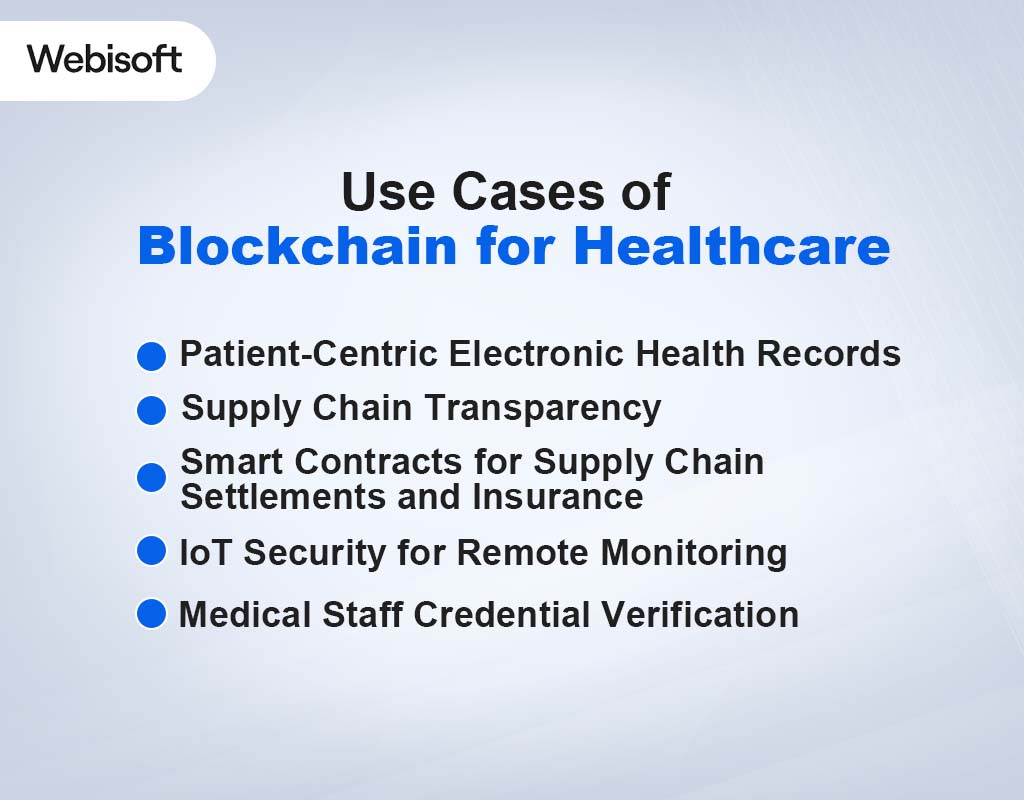
Blockchain technology’s applications in healthcare extend across patient records, supply chains, smart contracts, IoT security, and staff credentialing. These use cases empower you with secure, transparent, and efficient healthcare processes, ensuring data integrity, trust, and improved patient care.
Patient-Centric Electronic Health Records
Incorporating blockchain ensures secure, accessible, and accurate electronic health records (EHRs) for you. It grants you control over your medical data, allowing easy and secure sharing among healthcare providers.
Supply Chain Transparency
Blockchain offers transparent supply chains in healthcare, enabling you to trace the journey of pharmaceuticals and medical supplies. It ensures authenticity and reduces the risk of counterfeit products.
Smart Contracts for Supply Chain Settlements and Insurance
With blockchain’s smart contracts, you benefit from automated supply chain and insurance settlements. This technology ensures faster and more transparent transactions, reducing delays and disputes.
IoT Security for Remote Monitoring
Blockchain secures IoT devices for remote patient monitoring, ensuring data integrity and privacy. It safeguards patient data collected from wearable devices, ensuring confidentiality.
Medical Staff Credential Verification
Blockchain enables easy verification of medical staff credentials, ensuring authenticity and accuracy. You gain access to validated qualifications, enhancing trust and patient safety.
Challenges in Using Blockchain for Healthcare
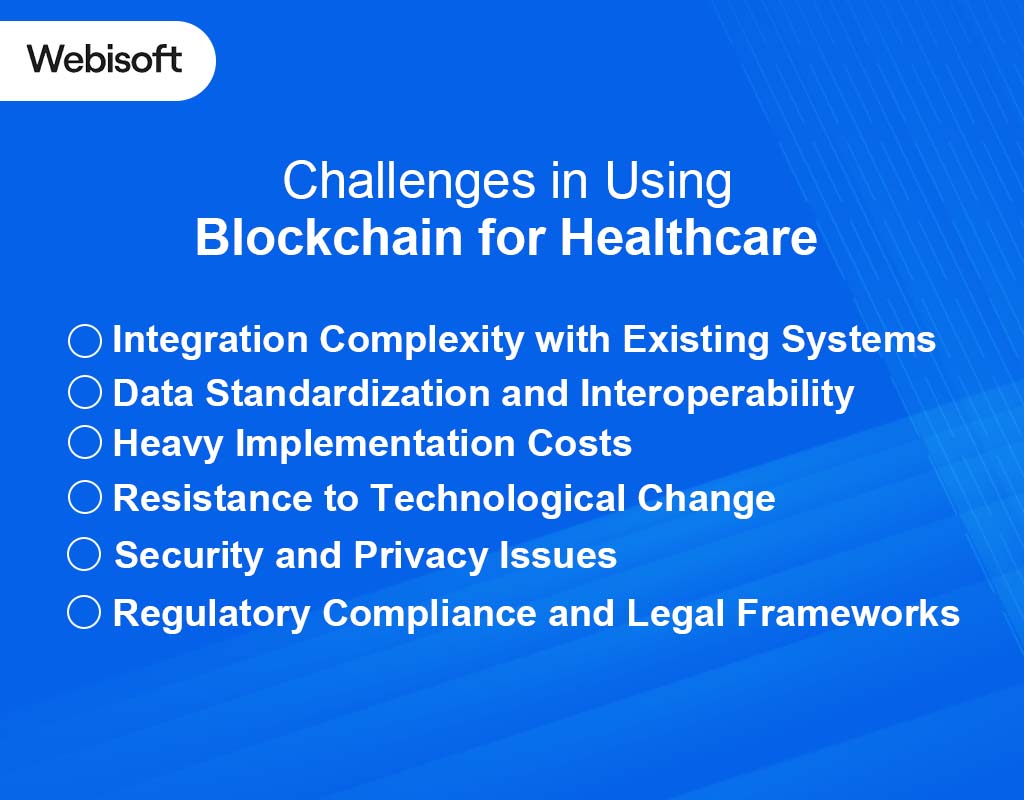
You may face different challenges in using blockchain for healthcare. Those are:
Integration Complexity with Existing Systems
Integrating blockchain into existing healthcare systems may pose challenges. You might face complexities aligning this technology with diverse legacy systems.
Data Standardization and Interoperability
Achieving data standardization across different healthcare systems can be challenging. Ensuring data uniformity and interoperability for unified communication is crucial.
Heavy Implementation Costs
Implementing blockchain in healthcare incurs initial and ongoing expenses. Managing these infrastructure, training, and maintenance costs might pose financial challenges.
Resistance to Technological Change
Adopting blockchain requires a cultural shift within healthcare organizations. Overcoming resistance to change and fostering technology adoption among the workforce can be challenging.
Security and Privacy Issues
Addressing security and privacy concerns related to blockchain implementation is crucial. Ensuring the secure storage of sensitive patient data remains a significant challenge.
Regulatory Compliance and Legal Frameworks
Adhering to evolving regulatory frameworks in healthcare poses challenges. Navigating legal aspects and ensuring compliance with regulations can be intricate and time-consuming.
How does Webisoft Facilitate Blockchain Development in the Healthcare Industry?
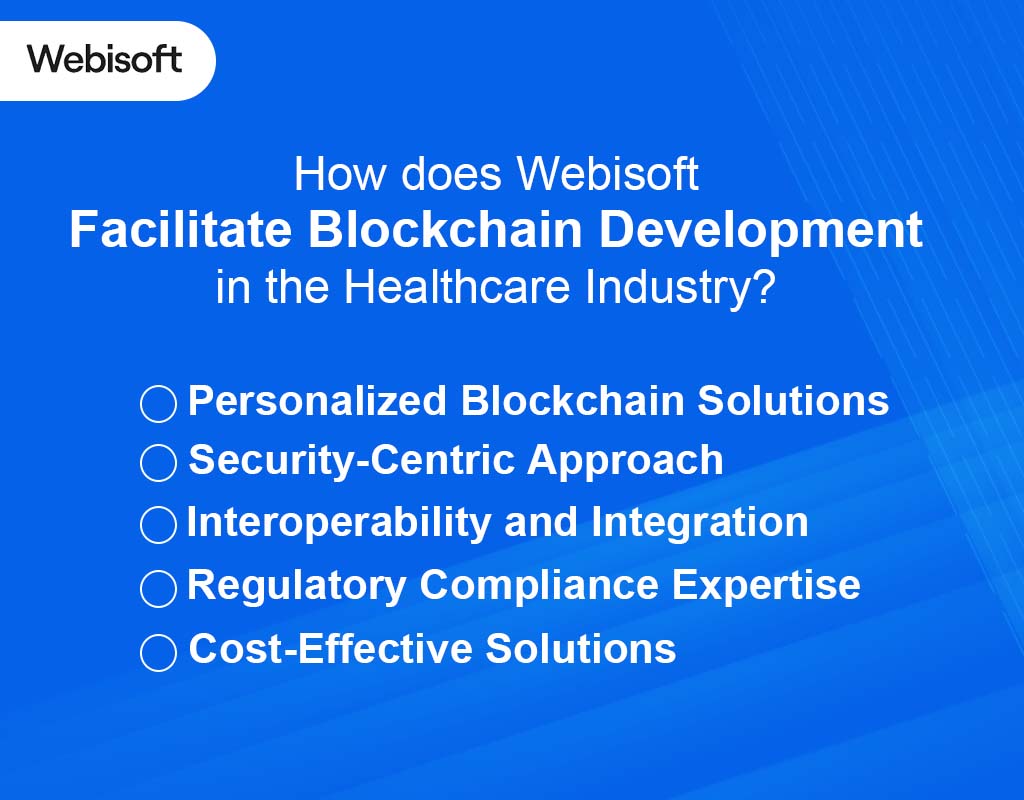
Webisoft‘s expertise in blockchain development ensures personalized, secure, and compliant solutions. Through blockchain development, we empower healthcare institutions with efficient data management and improved patient care. However, Webisoft facilitates the blockchain for the healthcare industry in the following ways:
Personalized Blockchain Solutions
Webisoft offers customized blockchain solutions custom-made to your healthcare needs. These solutions integrate easily with your existing systems, ensuring efficiency.
Security-Centric Approach
You benefit from Webisoft’s security-centric approach to blockchain development. We prioritize strong encryption and secure data storage for patient confidentiality.
Interoperability and Integration
Webisoft focuses on achieving interoperability with existing healthcare systems. We ensure unified integration of blockchain for efficient data sharing and communication.
Regulatory Compliance Expertise
Webisoft provides expertise in steering regulatory compliance within healthcare. We ensure that blockchain solutions align with evolving healthcare regulations.
Cost-Effective Solutions
Webisoft offers cost-effective blockchain solutions for healthcare. We optimize costs without compromising the quality and security of the technology.
Bottom Line
Blockchain for healthcare is a beacon of trust and security in the healthcare landscape, offering robust solutions to age-old challenges. Its ability to ensure data integrity, enhance collaboration among healthcare providers, and prioritize patient privacy makes it indispensable in modern healthcare.
However, blockchain implementation signifies a commitment to elevating patient care through secure, transparent, and interconnected systems.
So, ready to embrace the future of healthcare with blockchain? Contact Webisoft today and board on a journey toward a more secure, efficient, and patient-centric healthcare environment.
FAQ
Is Blockchain Secure for Healthcare Records?
Absolutely! Blockchain’s encryption and decentralized nature make healthcare data tamper-resistant, ensuring its security. Webisoft prioritizes data safety in healthcare solutions.
Can Blockchain Improve Patient Care?
Yes, it can! By securely sharing accurate patient data, blockchain facilitates faster and more precise diagnoses and treatments. Webisoft uses this for improved healthcare outcomes.
Is Blockchain Cost-Effective for Healthcare Providers?
Despite initial implementation costs, blockchain reduces administrative expenses by streamlining processes and reducing errors. Webisoft ensures efficient integration for cost-saving benefits.
How Does Webisoft Implement Blockchain in Healthcare?
Webisoft customizes Blockchain solutions, integrating them into healthcare systems to ensure data security, interoperability, and efficiency.
